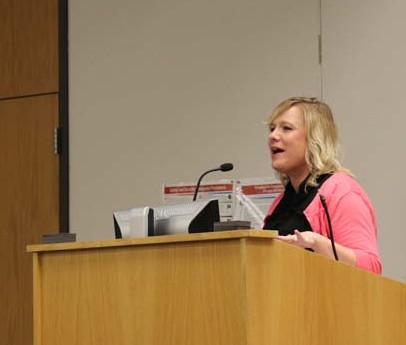Nutrition expert recommends non-diet approach

 The walk-fit program offered by OCCC held a diet and fitness seminar hosted by Oklahoma Nutrition Expert Kimberly Davis on July 8.
The walk-fit program offered by OCCC held a diet and fitness seminar hosted by Oklahoma Nutrition Expert Kimberly Davis on July 8.
Davis’ presentation covered various topics in regards to the problems with popular diets in our society, poor diet strategies, consequential health risks, as well as suggesting a new diet strategy that is, as she put, “gaining a lot of ground” called the “non-diet approach to weight loss.”
She explained this strategy focuses on achieving permanent weight loss by making exercise and sensible eating habits apart of daily life.
“Most of the clients I see, only need ‘tweaking’ with their behaviors towards food and physical activity, they don’t need to go on a diet, they need help making these changes and also learning about internal cues on when it’s time to eat” said Davis.
Davis noted that 95 to 98 percent of all diets fail and 96 percent of people who go on diets usually regain the weight they lost in a year’s time.
She explained that the non-diet approach to weight loss isn’t necessarily a diet at all, but training your mind and body to listen to the internal hunger cues our bodies give off when it’s time to eat instead of the external cues that tell us it’s time to eat such as, a lunch break.
She reasoned that diets are ineffective because the physical and emotional human response to food restriction makes them virtually impossible to commit to. Dieting activates portions of the brain that is responsible for paying attention to the reward properties of food, increasing food intake.
“Dieting makes the body and the mind hungry, causing dieters to become pre-occupied with food which leads to binge-eating.
“When people are restricting from certain foods for a long period of time, it’s natural for them to over eat” explained Davis.
Dieters who fall into a cycle where they lose weight, but constantly put it back on (known as yo-yo dieting), actually have an increased risk of heart disease and an increased mortality rate, warned Davis.
The non-dieting approach allows one to build confidence in their own ability to select appropriate foods for their body at the appropriate amounts.
By changing one’s behavior by dropping the “good food versus bad food” mentality and adding enough fat in a person’s diet, it prevents the body from going into starvation mode and instead creates satiety, which is the cue our bodies give off when we’re feeling satisfied during meal time, explained Davis.
The walk-fit program is a part of the OK 1050 initiative to bring awareness and urge students to be more active.